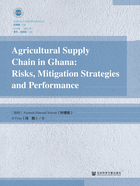
ABSTRACT
Recent years have witnessed the growing research interest in agricultural supply chain risk and agricultural supply chain performance. Agricultural supply chain stakeholders operate in complex chain and unstable environment,where the perishabilities of the products are reduced to ensure quality products that are delivered to customers. Therefore,for participants/firms in agricultural supply chain to remain in business,there is the need to maintain and improve the performance of the complex system of the chain. To achieve this,there is the need to identify,evaluate and mitigate potential risks associated with the chain to unearth risks and risk mitigation strategies for probable impact on the chains’ performance by allocating scare resources gainfully to improve the overall performance of the chain.
The book identifies the supply chain related risks in Ghanaian agricultural supply chain. Based on engineering judgments and historical records,the severity of risks and the ability of participants to manage them are assessed. With the availability of scare resources to most firms,it would be appropriate to understand the effects of each identified risks on the performance of chain to gainfully allocate resources to mitigate them. Secondly,by analyzing empirical statistics,the impact of the different categories of major supply chain risks is investigated in Ghana’s agricultural supply chain performance.
After revealing the impact of supply chain risks on the chains’ performance,the book further seeks to identify potential mitigation strategies to mitigate these risks in Ghana and their impact on chains’ performance.
The book also reveals that all global supply chain related risks indeed exist in agricultural supply chain of Ghana. While some risks such as market related risks are inevitable in the supply chain,others such as political related risks and some elements of weather related risks do not exit and seldom occur in the agricultural supply chain in Ghana respectively. There are also indications that,participants of the agricultural supply chain in Ghana have different abilities in managing different risks in the chain. While there are weak/no abilities to manage financial related risks,the participants could effectively manage risks related to management and operations of the chain.
The book empirically reveals that,agricultural supply chain risk sources emerging from demand and supply (market),weather,logistics and infrastructure and finance risks negatively and significantly undermines the agricultural supply chain performance in Ghana. However,risk sources related to biology and environment,management,operations,policy and regulation and political related issues insignificantly affect the performance of agricultural supply chain.
Lastly,the empirical results in this book indicated that,participants in the agricultural supply chain in Ghana adopted varieties of mitigation strategies to mitigate different risks associated with the chain. However,not all the mitigation strategies employed in agricultural supply chain significantly improve the performance of the chain. While some of the studied mitigation strategies (avoidance,control,coordination and flexibility) positively and significantly influenced the performance of the chain,the adoption of acceptance as mitigation strategy generally outcomes negatively and significantly affects the performance of the chain.
In conclusion,this study advocates the allocation of scarce resources to the mitigation of demand related risks,supply related risks as well as weather related risks,logistical and infrastructural related risks and financial related risks,in order to improve agricultural supply chain performance in Ghana. Also this study pushes the use of avoidance,coordination,control and flexibility mitigation strategies to mitigate risks associated with a chain to improve the performance of the chain in Ghana.
Keywords:Agriculture,Ghana,Identification,Mitigation,Risk,Supply Chain,Performance